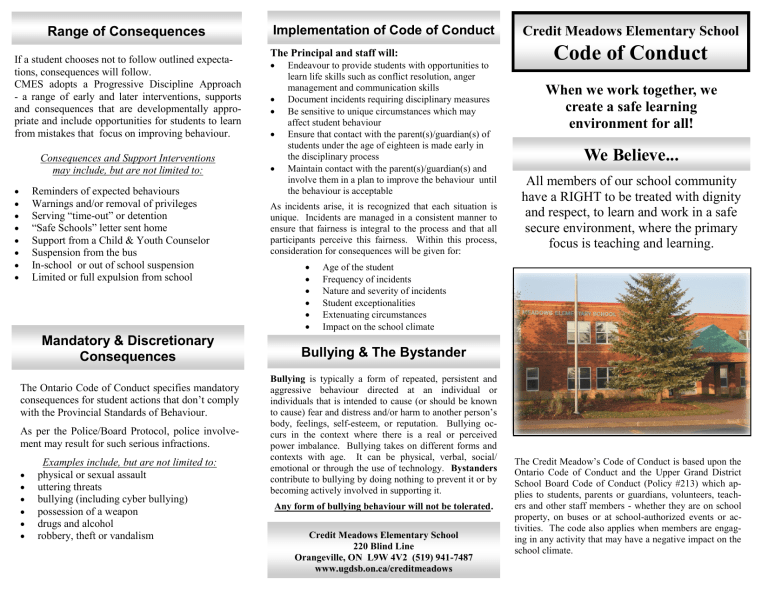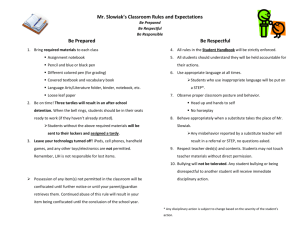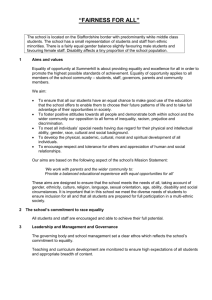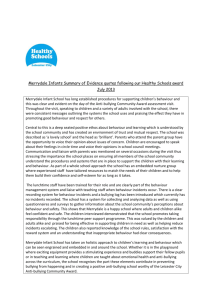Range of Consequences

Range of Consequences
If a student chooses not to follow outlined expectations, consequences will follow.
CMES adopts a Progressive Discipline Approach
- a range of early and later interventions, supports and consequences that are developmentally appropriate and include opportunities for students to learn from mistakes that focus on improving behaviour.
Consequences and Support Interventions may include, but are not limited to:
Reminders of expected behaviours
Warnings and/or removal of privileges
Serving “time-out” or detention
“Safe Schools” letter sent home
Support from a Child & Youth Counselor
Suspension from the bus
In-school or out of school suspension
Limited or full expulsion from school
Mandatory & Discretionary
Consequences
The Ontario Code of Conduct specifies mandatory consequences for student actions that don’t comply with the Provincial Standards of Behaviour.
As per the Police/Board Protocol, police involve-
ment may result for such serious infractions.
Examples include, but are not limited to: physical or sexual assault uttering threats bullying (including cyber bullying) possession of a weapon drugs and alcohol robbery, theft or vandalism
Implementation of Code of Conduct
The Principal and staff will:
Endeavour to provide students with opportunities to learn life skills such as conflict resolution, anger management and communication skills
Document incidents requiring disciplinary measures
Be sensitive to unique circumstances which may affect student behaviour
Ensure that contact with the parent(s)/guardian(s) of students under the age of eighteen is made early in the disciplinary process
Maintain contact with the parent(s)/guardian(s) and involve them in a plan to improve the behaviour until the behaviour is acceptable
As incidents arise, it is recognized that each situation is unique. Incidents are managed in a consistent manner to ensure that fairness is integral to the process and that all participants perceive this fairness. Within this process, consideration for consequences will be given for:
Age of the student
Frequency of incidents
Nature and severity of incidents
Student exceptionalities
Extenuating circumstances
Impact on the school climate
Bullying & The Bystander
Credit Meadows Elementary School
Code of Conduct
When we work together, we create a safe learning environment for all!
We Believe...
All members of our school community have a RIGHT to be treated with dignity and respect, to learn and work in a safe secure environment, where the primary focus is teaching and learning.
Bullying is typically a form of repeated, persistent and aggressive behaviour directed at an individual or individuals that is intended to cause (or should be known to cause) fear and distress and/or harm to another person’s body, feelings, self-esteem, or reputation. Bullying occurs in the context where there is a real or perceived power imbalance. Bullying takes on different forms and contexts with age. It can be physical, verbal, social/ emotional or through the use of technology. Bystanders contribute to bullying by doing nothing to prevent it or by becoming actively involved in supporting it.
Any form of bullying behaviour will not be tolerated.
Credit Meadows Elementary School
220 Blind Line
Orangeville, ON L9W 4V2 (519) 941-7487 www.ugdsb.on.ca/creditmeadows
The Credit Meadow’s Code of Conduct is based upon the
Ontario Code of Conduct and the Upper Grand District
School Board Code of Conduct (Policy #213) which applies to students, parents or guardians, volunteers, teachers and other staff members - whether they are on school property, on buses or at school-authorized events or activities. The code also applies when members are engaging in any activity that may have a negative impact on the school climate.
Credit Meadows Elementary School Rights & Responsibilities
When students, parents/guardians and the school work together, we create a safe learning environment for all!
Student Rights... Parent/Guardian Rights... Staff Rights...
To be treated with dignity and respect
To be provided with activities that build on individual strengths
To receive a quality education in a safe learning environment
To attend a school that is drug, alcohol and weapon free
To be treated with dignity and respect
To have concerns addressed
To be heard
To communicate with the school
Parent/Guardian Responsibilities...
To be treated with dignity and respect
To have a safe working environment
To have parents and students involved in creating a positive school climate
To be actively involved in supporting, maintaining and following the Code of Conduct
Student Responsibilities...
In order to be successful and become good citizens, students are expected to:
Demonstrate respect for self, others, and those in authority
Fulfill expected academic obligations
Come to school punctually each day, prepared and willing to learn
Obey the rules of the school, on school buses, school trips and at other sites during school activities
Abide by the Dress Code
Use respectful language, free from profanity
Work cooperatively with staff and other students
Tell an adult if you or someone else is being bullied
Be honest in academic work
Demonstrate respect for the property of others and the property of the school
Adhere to the Computer Network and Internet
Use Policy
Parents/Guardians are partners in the education of their children and as such, parents are expected to:
Demonstrate respect for all students, staff, volunteers and the members of the school community
Support the efforts of school staff in maintaining a safe & respectful learning environment
Show an active interest in their child's school work and progress; Sign agenda books and monitor homework
Communicate regularly with their child’s school
Assist staff in dealing with disciplinary issues involving their child
Help their child be dressed appropriately for the weather and according to the Dress Code, well-rested, prepared and ready to learn
Provide their child with a nutritious breakfast and substantial lunch/snacks daily
Ensure that their child attends school regularly and on time and report their child’s absence or late arrivals promptly at 519-941-7487 Ext. 100
Be familiar with and help encourage their child in following the school’s code of conduct
Sign in at the office when visiting.
Staff Responsibilities...
As role models staff will:
Demonstrate care and commitment to academic excellence and a safe teaching and learning environment
Provide a safe, nurturing, engaging, welcoming, respectful inclusive environment
Hold students accountable for their actions and behaviour
Empower students to be positive leaders in their school and community
Maintain order in the school
Maintain consistent standards of behaviour for all students by teaching positive behaviour and good citizenship
Help students work to fulfill their potential, develop self-worth and prepare them for the full responsibilities of citizenship
Demonstrate respect for all students, staff, parents, volunteers and the members of the school community
Communicate openly and honestly


